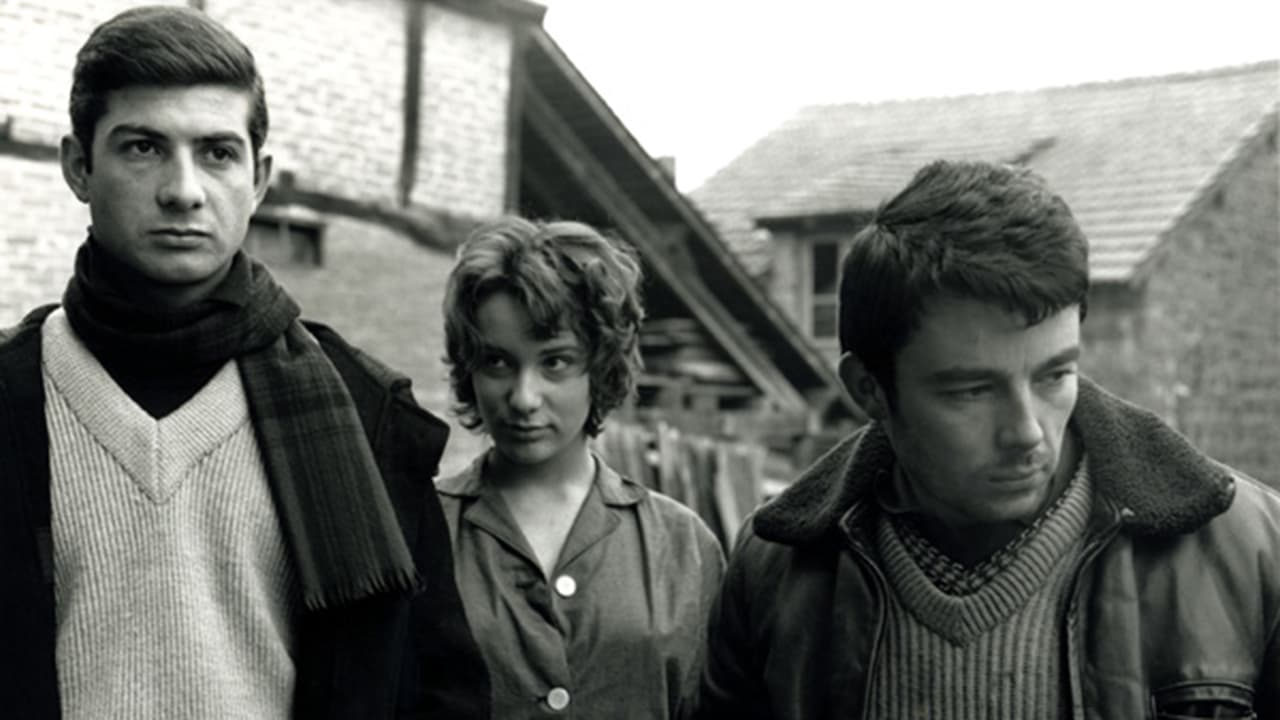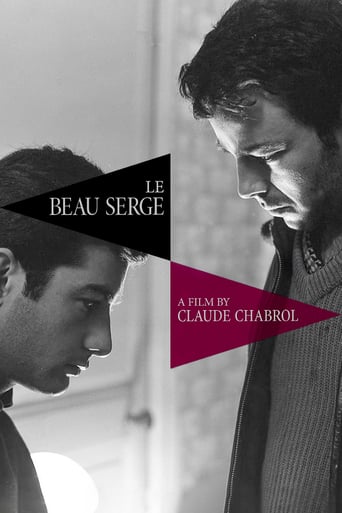

Very well executed
... View MoreBetter Late Then Never
... View MoreI have absolutely never seen anything like this movie before. You have to see this movie.
... View MoreIt is interesting even when nothing much happens, which is for most of its 3-hour running time. Read full review
... View More'Le Beau Serge' by Claude Chabrol is considered by many to be the first French New Wave to have ever been released. The screenplay written by Chabrol himself focuses on a young man named François Baillou who comes back to his childhood village to spend the winter there. He is amazed by how much the village has changed in his absence. He also encounters his old friend Serge who is now a man living a mundane state of existence with his pregnant wife.With a storyline which involves a character going back to his childhood village, one might expect a film that celebrates nostalgia like 'Cinema Paradiso', however 'Le Beau Serge' is anything but a film that wallows in nostalgia. This film brutally shows the discrepancies in the development and spread of modernity between the big cities and the villages in Post WWII France. The people in this particular village are living in a perennial state of hopelessness. They exist because they have to, they have no ambitions, no opportunities and no real goals. François with his urban sensibilities is horrified by the state of affairs here. The screenplay also gives us a bit of a mirror- like relationship between François and Serge. It is implied that their roles could have easily been reversed had things turned out slightly differently. Serge could have been the one who went to the cities while François could have been trapped in this village. This overwhelms François with a sense of guilt to see his childhood friend live in hopelessness. So he decides to bring in a change in attitude towards life in the village as a whole as well as help Serge in almost a Christ-like fashion.The screenplay falters a bit when it comes to the depiction of female characters. The two major female characters, namely Marie and Yvonne are nothing but two female stereotypes on the opposite ends of the spectrum. Chabrol's direction doesn't really add any depths to these characters. Marie is nothing short of a plot device and her choices in the film make little sense. There is also a very disturbing incident that takes place in the film and the justification given for it made it even more shocking and not in the admirable way. Another flaw in the film is the unnecessary way in which the Christ-like nature of François' motives gets verbally referenced by other characters. It was clear and there need not have been the overt declaration of it.Although this was the first New Wave film, but this was before the release of more monumental works like Truffaut's 'The 400 Blows' and Godard's 'Breathless'. So it doesn't have the unique storytelling and editing techniques that were ushered in by those films and feels a little more standard and conventional. As a matter of fact, 'Le Beau Serge' has a bit of an Italian Neo-realist feel to it due to the way the film depicts the sorry and stagnant nature of life in post-war France. The camera moves a lot in the shots and regularly pans rapidly to a particular portion of the shot to reveal something important. Chabrol also uses a lot of tracking shots in the film. Technically the film is well shot and put together.'Le Beau Serge' was a solid first film for Chabrol, it is well directed, competently acted and the story has something to say. But I believe there are also some flaws in the film that I couldn't overlook. It still deserves to be recommended.
... View MoreIn France, François Baillou (Jean-Claude Brialy) returns to his village to spend the winter as part of his treatment of tuberculosis. On the arrival, François sees his former best friend Serge (Gérard Blain) and greets him, but Serge is drunk and does not recognize him.François learns that Serge is a frustrated man since he had not gone to the Architecture University and has stayed in the village working as truck driver since he had to marry his pregnant girlfriend Yvonne (Michèle Méritz). When the baby was born, he was mongoloid and died. Now Serge is the drunkard of the village. François meets the seventeen year-old Marie (Bernadette Lafont), who is the slut of the village, and he feels attracted by the teenager. Meanwhile he tries to help his friend."Le Beau Serge" is the debut of the great French director Claude Chabrol that shows his talent to tell a simple and realistic drama. The performances are top-notch and the open conclusion is a trademark of Chabrol. It is weird to see a man treating tuberculosis smoking so many cigarettes along the story. My vote is seven.Title (Brazil): "Nas Garras do Vício" ("In the Claw of the Addiction")
... View MoreFrance's so-called New Wave was a confluence of pretension and mediocrity. It was first and foremost a mid-fifties school of film criticism that postulated that (1) cinema was of great intellectual import, probably too good for the masses, and that (2) most successful French directors before the publication of its fanzine, "Les Cahiers du Cinéma" (Marcel Carné, Julien Duvivier, Marcel L'Herbier, Jean Gremillon, Henri-George Clouzot, Jean Delannoy, Henri Decoin, to name a few) should be despised, shunned, bullied, ridiculed and persecuted or at least treated with suspicion while most American directors of the same period (except for Wyler, Zinnemann and Stevens) were to be considered as "geniuses" and "pioneers". It was therefore based on a misunderstanding which made it more important to talk intelligently and pretentiously about films (thereby excluding most people from film appreciation) than to make films that people would actually want to see.The movement had two cliquish firebrands, Jean-Luc Godard - who made increasingly unwatchable and solipsistic films all through his career - and François Truffaut - an acid-tongued journalist who attained a certain commercial success with the help of snobism, in spite of his idiotic and dogmatic principles and his obvious lack of talent and humanity. They will always be remembered as the two vindictive and parochial "mean girls" of French cinema and judged by posterity as "dwarves standing on the shoulders of the giants that preceded them" (e.g.: Jean Renoir, René Clair and Sacha Guitry). Their main legacy is the sad fact that very few of France's really important films (i.e. pre-New Wave) have been preserved and restored for posterity, unlike their own idiotic opuses. For good measure, Truffaut also despised the work of Jean Gabin, Michèle Morgan, Gerard Philippe and Michel Simon. This misunderstanding also means that all the more successful, quietly innovative or truly revolutionary films of the period have been claimed as "New Wave" when they simply were not (e.g.: the best films of Chabrol, Malle, Varda, Demy, Resnais and Rohmer) and their directors have repeatedly said so, while the films of their "enemies" were excluded from any form of recognition (e.g.: Marcel Carné's "Les Tricheurs" and Julien Duvivier's "La Fête à Henriette")."Le Beau Serge" is a case in point. It can only be considered "New Wave" in that it is made with no money by a young, dedicated but inexperienced director who tried to imitate his elders and betters and made many mistakes along the way. At that point, Malle didn't know how to sustain attention, direct actors or put a final product together (look at the editing and listen to the music, all dreadful).This film is only watchable today because of Gérard Blain's heartfelt James Dean impression, Blain having been exploited by the New Wave for his charm and screen presence (and the fact he was married to Bernadette Lafond) and then vomited as soon as he started producing intelligent films that didn't carry the official New Wave label (e.g.: "Les Amis", 1970).Everything I wrote here has been written countless times before but it can never be repeated often enough.Chabrol himself once said: "There is no new wave, there is only the ocean."
... View MoreIf this was indeed the first film of the New Wave then it has a lot to answer for. Unless there are other causal influences I don't know about, the New Wave destroyed French cinema. Old wave films like Carné's "The Children of Paradise" (1943), Clouzot's "The Wages of Fear" (1953), and Tati's "My Uncle" (1958) make Truffaut, Renais and Chabrol look earthbound and dreary. As, by and large, they are. (Even in the years after 1959 France's best films had little to do with, and owed little to, the New Wave.) But "Beautiful Serge" is at least a nice little film, only somewhat earthbound, and not so dreary at that.An earlier reviewer has complained about the music; and, indeed, at the screening I attended there were some people up the back determined to chortle at what they perceived to be musical heavy-handedness. A cheap response would be that the film needed SOMETHING to lift it above the level of a 7-Up documentary. A fairer response would be that this is a story in which the theological significance of the hero's actions shines through a mundane surface, and the score serves to express that, too. It's the faint but real sense of fantasy that keeps "Beautiful Serge" very much alive.
... View More